On June 14th, the same tournament that unites nations, stops wars, and brings countries from across the world to compete against each other, will begin for the 21st time.
The World Cup is hosted every four years, each time in a different country than the one before. In 2018, 32 countries will partake in the tournament and only one will be crowned champion. While major soccer competitions come around every year, none are quite like the World Cup.
The first World Cup was held in Uruguay in 1930, with only 13 teams participating. Uruguay went on to win it against their South American rival, Argentina. 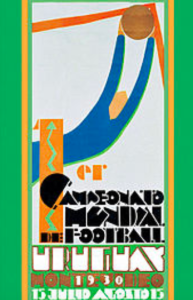
Since then, many changes have been put into place, diversifying the game and making it the most memorable sporting event in the world.
The 2014 World Cup, hosted by Brazil, had millions of viewers throughout the whole competition, but the final itself was viewed by over 1.01 billion people around the world, according to statistics published by FIFA.
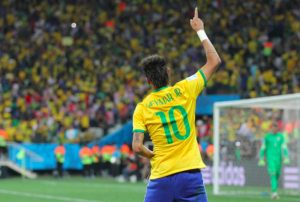 Gabriel Asher witnessed the 2014 World Cup and reiterated how he felt, “It [the 2014 World Cup] was a life changing event. Watching Germany’s defeat of Brazil really tugged at my heart, seeing all of the poor Brazilians witness such a shock defeat in their homes, it was surprising and will remain in my heart forever.”
Gabriel Asher witnessed the 2014 World Cup and reiterated how he felt, “It [the 2014 World Cup] was a life changing event. Watching Germany’s defeat of Brazil really tugged at my heart, seeing all of the poor Brazilians witness such a shock defeat in their homes, it was surprising and will remain in my heart forever.”
For generations now, the World Cup has been gathering viewers and unting countries, while providing the world with fantastic soccer and unforgettable moments both on and off the pitch, from both players and fans.
As a result of hosting the 2010 and 2014 World Cups, South Africa and Brazil respectively, saw a substantial increase in employment throughout the tournament, with over one million people being hired in Brazil alone. This shows the impressive work of the World Cup as it creates jobs in developing countries.
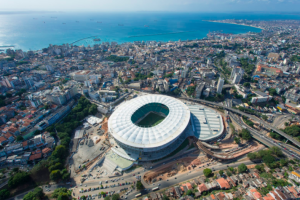 Tourism also generated substantial amounts of revenue in both countries, thanks to the near 1.5 million people who visited both countries during the tournament each time. Since both countries are NICs, a newly industrialized nation, this was incredibly beneficial.
Tourism also generated substantial amounts of revenue in both countries, thanks to the near 1.5 million people who visited both countries during the tournament each time. Since both countries are NICs, a newly industrialized nation, this was incredibly beneficial.
“Playing host will immediately raise the global profile of a country and might even change perceptions of the host nation, resulting in increased tourism and political benefits and alliances, but accrue over many years,” said said Walter Boettcher.
The World Cup, though, is also about bringing people together and sparking a nationalistic fuse inside each fan watching the game.
In the last World Cup, an average of 26 million Americans watched the World Cup, however, less than 19 million on average watched each of the 2017 World Series games, an “American must watch”, according to CNN
The fact that 26 million Americans watched the World Cup is incredible, especially seeing as  the United States is not a very soccer enthused country like Brazil or England. It simply shows how special the World Cup truly is.
the United States is not a very soccer enthused country like Brazil or England. It simply shows how special the World Cup truly is.
Fabrice Gray, an avid American soccer fan, expressed how he felt about the U.S not being in the World Cup this year. “While it’s expected, it really upsetting not seeing them participate in such a captivating event, especially since it slows down the development of soccer here.”
One of the most important things the World Cup does, though, is it allows for countries from all over the world to take part in the tournament. This year many new countries, or countries that haven’t played in a World Cup in a long time, will be taking part.
Iceland and Panama are both new to the World Cup stage, while Egypt, Saudi Arabia, Peru, and Morocco are all returning after a 20+ year absence. This World Cup will be one of the most diverse in a long time and will allow for people from all over the world to feel proud of their national teams.
The World Cup’s importance, however, is not only seen through the soccer played. Off the pitch and even before it has even started, unimaginable things have occured.
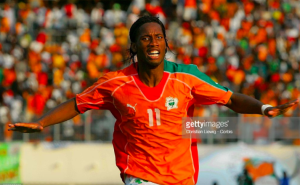 In 2005, Ivory Coast was in the midst of a civil war, raging across the country. During that same time, Didier Drogba and his fellow Ivorians were taking the field against Sudan for a deciding World Cup qualifier.
In 2005, Ivory Coast was in the midst of a civil war, raging across the country. During that same time, Didier Drogba and his fellow Ivorians were taking the field against Sudan for a deciding World Cup qualifier.
Following Ivory Coast’s dramatic 3-1 victory, Drogba addressed his nation, pleading for them to embrace the happiness of the upcoming World Cup, lay down their guns, and hold proper and organized elections. Soon after, a cease fire occurred and in 2007, a year after Ivory Coast’s first appearance in the World Cup, a peace treaty was signed.
David Somay, from a soccer driven county, speaks of the emotion soccer brings, “Soccer can be an incredible force, it really takes a toll on you and can change so much about you or a country. Countries like mine [Argentina] pride themselves on their soccer and life revolves around it, so when the World Cup come around, there is a completely different and more hopeful environment around Argentina”
The World Cup, most importantly, is the center for the beautiful game. Mesmerizing goals are scored, fantastic saves are made, and no match is ever forgotten by those who watched.
Some of the most famous moments in all of soccer have come from the World Cup such as Pele’s rise on the world stage as a teenager, Maradona’s hand of god, Zidane’s headbutt, Ronaldo’s wink, Suarez’s bite, and more.
More intense then these specific moments, have been the games that have brought them. 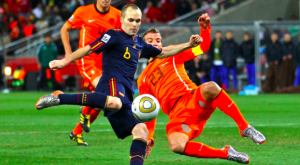 From Brazil’s 2-0 victory in the 2002 final against Germany, to their 7-1 defeat in 2014. The Netherlands dramatic 1-0 loss over Spain in 2010, and the Italian victory over France that went into penalties. All of these games have provided fans with fantastic soccer.
From Brazil’s 2-0 victory in the 2002 final against Germany, to their 7-1 defeat in 2014. The Netherlands dramatic 1-0 loss over Spain in 2010, and the Italian victory over France that went into penalties. All of these games have provided fans with fantastic soccer.
“The events of the World Cup will be remembered for years to come by fans of the sport throughout the world, who enjoy the spectacle from the comfort of their home, stadium or even their local diner,” said soccer fanatic Charles Lane.
As the regular season comes to an end and the World Cup approaches, the world will gather in awe and witness the most amazing sport in the most spectacular sporting event that there is to offer.
By Nico Vallada


































































